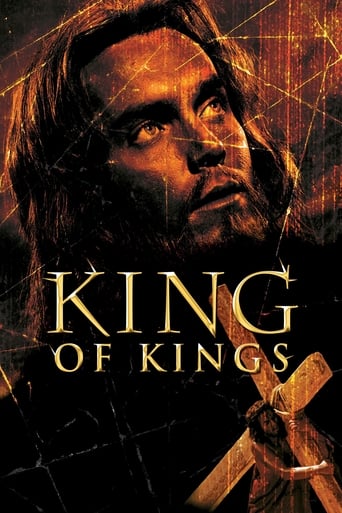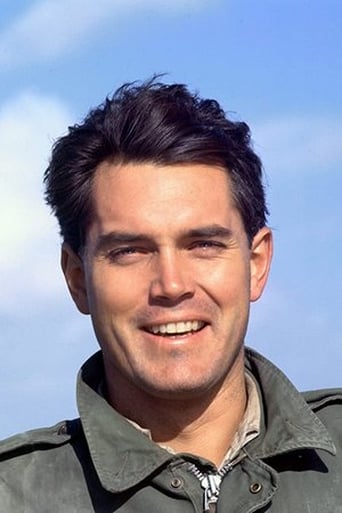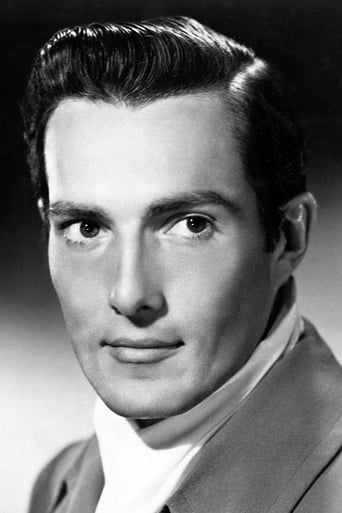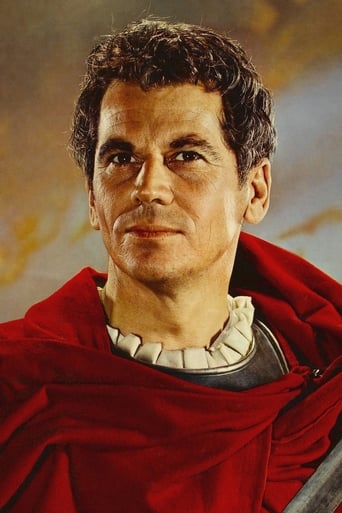federovsky
A retelling of the gospels from Samuel "more-studio-than-sense" Bronston - clearly this is the film that Python was lampooning in The Life of Brian. The Biblical humourlessness is to be expected, but it's also rigid and stylised, either by design or lack of imagination, which lends it the unfortunate feel of a primary school nativity play.The story is embellished on the political side, with Hurd Hatfield playing a camp and effete Pilate and Brigid Bazlen's Salome providing the most memorable scene, relieving us of Robert Ryan's tedious John the Baptist, for which those of us without religious scruples may be thankful. Jesus and the disciples come across as a kind of gay brotherhood, which it is tempting to presume was Ray's hidden agenda.Spiritually it fails to uplift, partly because of the artificiality of the presentation, partly because Jesus seems to be in an insensate trance the whole time which undermines any sense of actual suffering. Mainly though, it's the explicit implication that God is pulling all the strings that subverts the power of the story. Later adaptations have avoided those pitfalls, this film is rooted in them.
Henry Kujawa
Just finished KING OF KINGS (1961). This is a study in contrasts. It reminds me a bit of another film Harry Guardino was in-- MADIGAN (1968). Now let me explain that. MADIGAN is-- supposedly-- a story about a tough detective and his partner trying to track down an insane killer, while the main character's marriage slowly disintegrates. But more than half the film focuses on the Police Commissioner and HIS problems, and except for a couple of very brief scenes where they cross paths, the two parts of the film have nothing in common. Perhaps it was an early example of "parallel" storytelling. All I know is, the first time I saw it, it left me very frustrated.With KING OF KINGS (which, as someone rightly pointed out at the IMDb site, is, in NO way a remake of the Cecil B. Demille silent film of the same name!!) more than half the film is a "Roman Empire" movie, all about opulence, excess, depravity, evil, etc. Until about the time of the "sermon on the mount" scene, Jesus is reduced to a bit player in what is allegedly "his" movie. This is not necessarily a bad thing, as the same was done in THE ROBE and BEN HUR (the latter appears to be the film MGM most deliberately was trying to copy in style, right down to the movie poster art). But depending on what you're looking for, this film can be baffling, maddening, frustrating, or simply inspiring. Take yer pick.For example... virtually all the miracles are described, not shown. The scene where the crowd shouts to free "Barrabus!" --is DESCRIBED, not SHOWN! (When that happened, my jaw dropped, even though today was probably the 5th time I've seen this over the years.) Even the death of Judas-- Barrabus finds his body just as the tree branch breaks, you don't actually see him kill himself.It is interesting how they expanded certain characters, like Lucius (Ron Randell), the Roman Centurion, who we wind up seeing all the way back to the slaughter of the newborns, the tax census-check-up 12 years later, in Pilate's court, and in charge of the crucifixion. (I've only seen Randell in one other movie-- THE LONE WOLF AND HIS LADY, which was really bad, even by "B"-movie mystery standards.)Barrabus, as someone said at the IMDb, is expanded from a mere murderer to a freedom-fighting rebel leader (like Judah Maccabbee), and is virtually the main character in the entire film. As for Harry Guardino, I've lost count of how many times I've seen him in DIRTY HARRY or THE ENFORCER.One of the most prolonged scenes in the film involves Herod Antipas, his wife, and their daughter (his wife apparently hadn't bothered to get a divorce from HIS BROTHER at the time). Someone noted it's almost surprising that after going to such lengths to show Salome's erotic dance for her father, and then the long, long, dramatic scene where she asks for the head of John The Baptist ("HAVE YOU LOST YOUR MIND???") they don't follow-up and show what happened to HER, afterwards. During the trial of Jesus, she's sitting there on the side, looking as if she has lost her mind. She seems totally in a trance or something, as if all life has gone out of her...Pilate (Hurd Hatfield, who some years back I finally got to see in THE PICTURE OF DORIAN GRAY) turns out to be a real bastard. They totally skipped the scene where Jesus is interrogated by the Jewish elders, but the trial before Pilate is shown in more detail than in the Bible, with Lucius arguing in Jesus' defense. When Herod sends Jesus back to Pilate, his anger & annoyance grows and he seems to relish having him whipped just for getting on his nerves, rather than breaking any law.What's interesting is... I read that some 45 minutes of footage was CUT just before release. Makes me wonder, WHAT did they cut? Could it have been any of the scenes merely described in remaining dialogue?It's still a fascinating film, but now I'm really looking forward to sitting thru Jesus OF NAZARETH again. I remember at the time that was made, it seemed the whole point to it was the do the "definitive" Jesus movie-- and in many ways, I think they succeeded. Even if it has the strange thing where they DON'T actually show any miracles on screen-- and you never see Jesus after he dies. It struck me the person who did the film may have aimed it at atheists-- to show them it doesn't matter if you believe he was the son of God or not-- his words and his actions were what counted.







